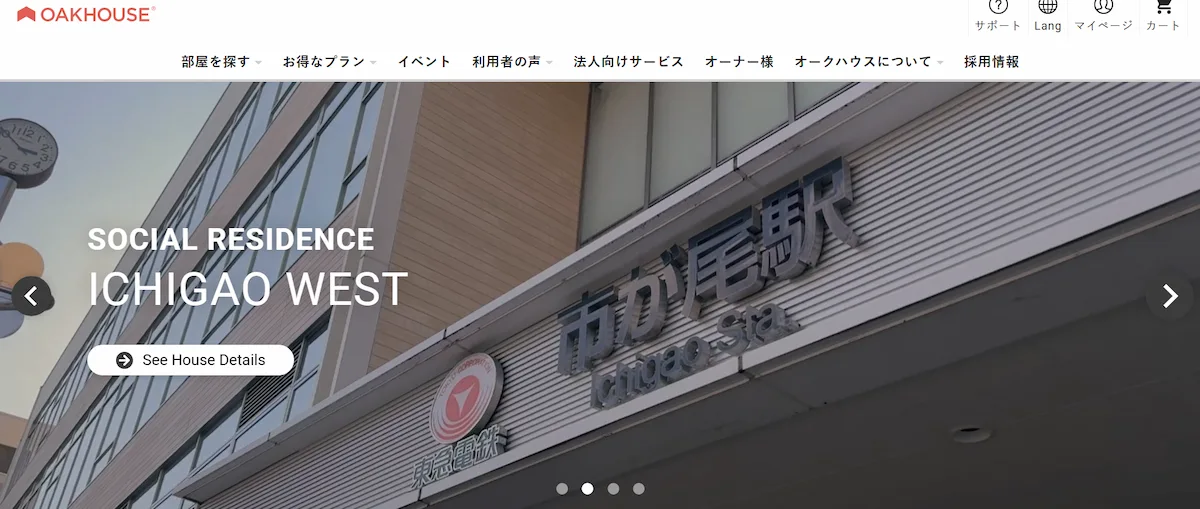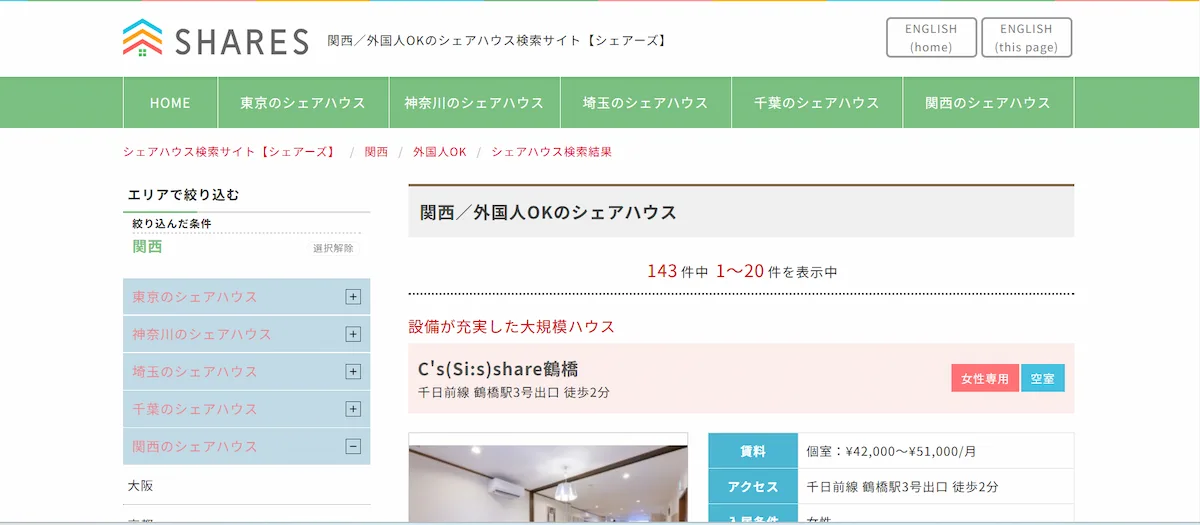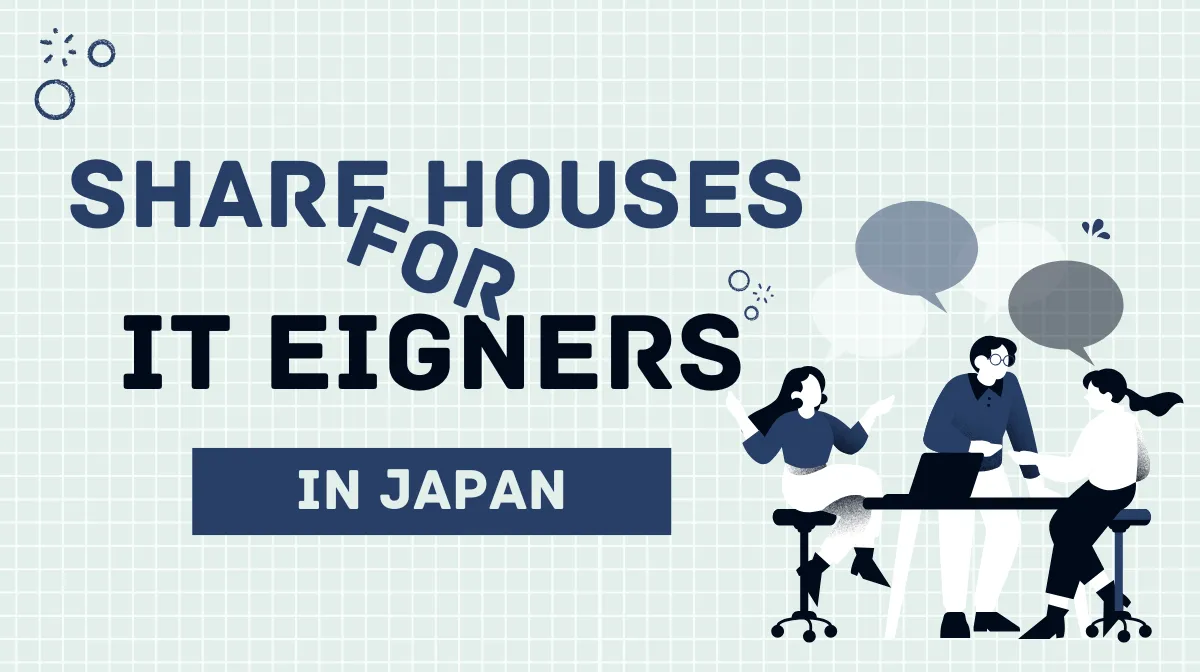Finding a place to live is one of the important challenges for foreign engineers working in Japan.
Especially in urban areas where IT companies are concentrated, there is an increasing number of share houses that offer facilities for remote work and opportunities to interact with the technical community.
This article will introduce in detail everything from key points in choosing properties specialized for engineers’ work styles to the actual experiences of residents.
- Key features of tech-friendly share houses for foreigners in Japan.
- How to choose the right location based on IT hub proximity.
- Real experiences from foreign engineers living in Japanese share houses.
1. Basic Knowledge About Share Houses for Foreigners

The share house situation in Japan has become an important option especially for foreign engineers. Share houses with excellent facilities and communities are increasing, particularly in urban areas where IT companies are concentrated, creating an environment where you can smoothly start your life in Japan.
Characteristics and Appeal of Japanese Share Houses
Japanese share houses offer value beyond just living spaces.
Especially for foreign engineers working in the IT industry, they are well-equipped with facilities that accommodate remote work, such as high-speed internet environments and workspaces in private rooms.
Common spaces are also used for information exchange and technical discussions with other engineers, helping to build professional networks.
Many share houses also have common spaces available 24 hours a day, providing an environment that can accommodate late-night work.
In terms of security, they provide a safe living environment with fingerprint authentication, surveillance cameras, and more.
Types of Share Houses Available to Foreigners
Share houses for foreign engineers are mainly classified into three types.
●Business-focused type
- Often located in areas where tech companies are concentrated
- Equipped with high-speed WiFi and private workspaces
- Many residents are engineers in the same field
●International exchange type
- Gathers IT talent from various nationalities
- Suitable for building global networks
●Skill-sharing type
- Regularly holds programming study sessions and tech events
- Provides an environment that supports the improvement of technical skills
Differences from General Properties and Reasons to Choose Them
Compared to general properties, share houses have many advantages for foreign engineers.
- Contract procedures are simplified, with support available from multilingual staff
- Initial costs are significantly lower compared to typical apartments, and they accommodate short-term contracts, allowing flexible response to project-based employment
- Many share houses are standard-equipped with facilities suited to engineers’ work styles, such as soundproof private rooms, stable internet environments, and UPS (uninterruptible power supplies)
- Valuable information exchange is possible through interaction with residents working in the same IT industry, including industry trends, job change information, and technical information
The above advantages are significant benefits for foreign engineers aiming to build their careers in Japan.
2. How to Choose a Share House for Foreigners

Especially for foreigners working as IT engineers in Japan, it’s important to choose properties that match their work characteristics.
It’s necessary to make choices that consider job-specific needs such as balancing remote work and office work, access to technical communities, and securing a comfortable work environment.
The Importance of Location and Access
The choice of share house location has a significant impact on your career as an engineer.
Good access to areas where major IT companies are concentrated, such as Shibuya, Shinagawa, and Roppongi, expands opportunities for changing jobs and career advancement.
Areas like Gotanda and Osaki, where many technology companies are gathered, are also attractive locations for engineers. It’s advisable to keep commuting time within 30 minutes if possible to reduce burden.
Furthermore, proximity to places where technical conferences and meetups are frequently held is also an important consideration point.
Equipment and Service Checkpoints
Particularly important for an engineer’s working environment is the quality of the internet connection. Check for fiber optic connection with a minimum speed of 1Gbps and whether wired LAN connection is possible in private rooms.
The presence of backup power for power outages and soundproof booths for remote work are also important. It’s even better if common spaces are equipped with meeting spaces and coworking spaces.
In terms of security, it’s necessary to confirm not only equipment such as fingerprint authentication and surveillance cameras but also whether dedicated network security measures are in place.
Budget Setting and Cost Breakdown
Considering the average income of engineers, it is recommended to allocate about 30% of take-home income to housing costs. In central Tokyo, private rooms typically cost between 60,000 and 100,000 yen per month.
However, this amount often includes high-speed internet, usage fees for common facilities, and utilities, making the actual burden reasonable compared to general apartments.
Many share houses also allow flexible contract periods, accommodating project-based work styles. Initial costs are typically about 1-2 months’ rent, and properties without security deposits or key money are increasing.
Furthermore, there is a possibility that some of the expenses related to working from home can be claimed as business expenses when filing tax returns, so it is recommended to consult with a tax accountant.
■日本でエンジニアとしてキャリアアップしたい方へ
海外エンジニア転職支援サービス『 Bloomtech Career 』にご相談ください。「英語OK」「ビザサポートあり」「高年収企業」など、外国人エンジニア向けの求人を多数掲載。専任のキャリアアドバイザーが、あなたのスキル・希望に合った最適な日本企業をご紹介します。
▼簡単・無料!30秒で登録完了!まずはお気軽にご連絡ください!
Bloomtech Careerに無料相談してみる
3. Points for a Worry-Free Move-In

There are several important points for foreign engineers working in the IT industry to smoothly start share house life in Japan.
In particular, comprehensive preparation is necessary, from visa-related procedures to securing a comfortable work environment.
Necessary Documents and Preparation
The documents needed for moving into a share house in Japan are simplified compared to general apartments, but there are points that require special attention as an engineer.
Required documents
- Original and copy of work visa, residence card, passport, national health insurance card
Important documents
- Employment contract from an IT company, service contract (in case of freelance)
Income verification documents
- Annual income certificate, pay stubs for the last 3 months, tax return documents (in case of freelance)
If you do a lot of remote work, it’s good to prepare work-from-home permission documents from your employer. Many share houses also allow the above documents to be processed in English.
Contract Points to Note and Confirm
When signing a contract, there are confirmation items specific to engineers’ work styles.
Be sure to check the rules regarding internet use (presence of bandwidth limitations, security policies, etc.) and guidelines on living noise during remote work.
Also important are allowed times for online meetings and video calls, and rules for working in common spaces.
Contracts are typically provided in both Japanese and English, but it is recommended to confirm until you have a clear understanding, especially regarding IT-related technical terms and technical descriptions.
It is also necessary to confirm in advance the flexibility of the contract period (whether contract changes are possible according to project periods, etc.).
Confirming Post-Move-In Support Systems
Confirming support systems tailored to engineers’ lifestyles is particularly important.
Many share houses have set up 24-hour IT support desks, establishing systems to respond quickly to network troubles and technical problems.
An environment is also in place for technical problem-solving and information exchange through the engineer community within the same share house.
In terms of language, properties with bilingual staff familiar with technical terms are increasing, making it possible to consult about work-related matters.
For emergency response systems, it is recommended to confirm that 24/7 management systems are in place to accommodate late-night work or work in different time zones.
It’s also good to confirm in advance the schedules for regular maintenance and updates, and the provision of alternative work environments during these times.
4. Recommended Share Houses for Foreigners

We’ll introduce share houses that provide an ideal environment for foreign engineers, by region.
We’ll focus on properties in areas with concentrations of IT companies or active technology communities, explaining them based on actual resident evaluations.
Agencies Handling Properties in the Tokyo Area
Many share houses with excellent facilities for engineers exist in Tokyo’s IT company concentrated areas.
Borderless House

They handle properties in major cities including Tokyo, the Kansai area, and Sendai.
They offer comprehensive online explanations and campaign rates. Many properties come standard equipped with Wi-Fi and private workspaces.
ARDEN (SHARE STYLE)
.webp)
ARDEN is popular among engineers working at startup companies. Many foreigners live there because they have properties from around 50,000 yen per month even in notable areas like Shibuya and Shinagawa.
Regular exchange events are held, providing many opportunities to experience Japanese culture.
OAKHOUSE

They handle various properties including international exchange properties and engineer properties.
They have extensive spaces for IT engineers, such as coworking spaces. It’s possible to check a wide range of properties centered on Tokyo, including Chiba, Kanagawa, and the Kansai area.
Notable Agencies in Osaka and Kansai Area
The Kansai area, centered on Osaka which is attracting attention as an IT hub in the Kansai region, has properties with excellent cost performance.
SHARES

They provide share house information specialized in the Kansai area. Many properties are telework-friendly, making it possible to find share houses with environments suitable for IT engineers.
Property Trends in Other Major Cities
Share houses for engineers are also increasing in regional cities such as Nagoya and Fukuoka. Share houses in Nagoya are popular among engineers working at automobile-related companies such as Toyota Group.
In Fukuoka, remote work-compatible share houses are abundant, centered around the Tenjin area, a startup company cluster.
Even in regional cities like Sapporo and Sendai, share houses for engineers are increasing with the advance of IT companies.
These properties, while having more affordable rent compared to the metropolitan area, are well-equipped with necessary facilities such as high-speed internet and private workspaces.
■日本でエンジニアとしてキャリアアップしたい方へ
海外エンジニア転職支援サービス『 Bloomtech Career 』にご相談ください。「英語OK」「ビザサポートあり」「高年収企業」など、外国人エンジニア向けの求人を多数掲載。専任のキャリアアドバイザーが、あなたのスキル・希望に合った最適な日本企業をご紹介します。
▼簡単・無料!30秒で登録完了!まずはお気軽にご連絡ください!
Bloomtech Careerに無料相談してみる
5. Experiences and Examples of Foreign Residents

Through the real experiences of foreign engineers living in share houses, we’ll introduce success points, common challenges, and their solutions.
These cases are based on the actual experiences of people working in the IT industry.
Success Stories and Tips for High Satisfaction
Michael (28)
who works at a Silicon Valley tech company
Through life in a Shibuya share house, I was able to greatly grow my career! Through interaction with residents working at Japanese IT companies, I not only caught up with local technology trends but also gained a deep understanding of needs specific to the Asian market.
Raju (32)
a freelance full-stack engineer from India
I live in a share house in Gotanda. From chance meetings in the coworking space, I often progress new project discussions or solve technical challenges. Also, I appreciate being able to handle late-night meetings with clients in a soundproofed private room.
Trouble Cases and Solutions
In share house life, work-specific issues also arise.
Many share houses can also respond quickly to network environment-related troubles.
Example: Trouble and solution of Lee (35), an engineer from Singapore
Trouble example
Had difficulty coordinating with other residents for late-night online meetings with teams in different time zones.
Solution
Consulted with the management company and arranged to use a highly soundproof meeting room 24 hours a day. Also, by exchanging information with residents who also work late nights, they came to understand each other’s work styles.
Example: Trouble and solution of James (30) from Canada
Trouble example
Network problems occurred late at night.
Solution
Thanks to the 24-hour IT support desk service, it was resolved, allowing him to meet an important deadline.
Benefits of Community Formation
The formation of technical communities is becoming an important element in career development.
Thomas (29)
a software engineer from Germany
Through share house life, interaction with engineers having various technology stacks has broadened my technical perspective. At weekend study sessions, we discuss new technology trends and exchange opinions on challenges in actual projects.
Ana (27)
from Brazil
I received a lot of advice from senior engineers about development culture specific to Japanese IT companies and agile development practices. I also formed a network of female engineers, which is a reference for career planning.
6. Q&A About Share Houses for Foreigners

We’ll introduce commonly asked questions from foreign engineers, along with specific answers.
We’ll deliver practical information, especially on IT industry-specific concerns and environments during remote work.
Common Pre-Move-In Questions and Answers
For the question “Is remote work possible?”, many share houses accommodate this.
They are equipped with consideration for engineers’ work styles, including work environments in private rooms, soundproof booths for online meetings, and backup power facilities.
Regarding network environments, high-speed lines of 1Gbps or more are generally standard equipped, and wired LAN ports are also provided.
For security concerns, many share houses have environments that can accommodate corporate security policies.
Private rooms can be locked, and it’s possible to secure a dedicated network segment if needed. For handling confidential information, properties that allow selection of security enhancement options under individual contracts are also increasing.
Resolving Post-Move-In Life Questions
Questions about whether work is possible late at night or early morning are also frequently asked.
Many share houses provide workspaces available 24 hours a day for engineers working globally.
Facilities and support systems are in place that anticipate collaboration with overseas teams with time differences and emergency trouble response.
Initiatives supporting engineers’ learning and skill improvement are also abundant, such as technical book sharing spaces, programming learning environment provision, and regular technical study sessions.
Technical exchange between residents is also active, helping to catch up on new technologies and solve practical challenges.
Trouble Response and Consultation Windows
Systems for responding to technical troubles are particularly well-developed.
24-hour IT support desks respond quickly to problems affecting work, such as network troubles and hardware failures.
Many share houses also provide technical support in English, Chinese, and other languages.
They can also respond to engineer-specific consultations such as confidentiality in business and various procedures related to working from home.
Many agencies also have experienced staff who support administrative procedures specific to foreign engineers, such as visa renewals and tax return filing.
7. Share Houses for Foreigners : Allies of IT Engineers Working in Japan
Share houses for foreign engineers provide value beyond just housing.
Excellent work environments, interaction with technical communities, and support for flexible work styles will greatly contribute to career building in Japan.
When choosing a property, we recommend careful consideration from the perspectives introduced in this article, taking into account your own work style and career plans.

















